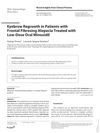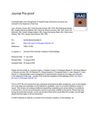Search
for
Sort by
Research
450-480 / 1000+ results
research Rapid Skin Repigmentation on Oral Ruxolitinib in a Patient with Coexistent Vitiligo and Alopecia Areata
A man with vitiligo and alopecia saw quick skin and hair improvement with ruxolitinib, but skin color gains were lost after stopping treatment.

research Female Pattern Hair Loss: A Pilot Study Investigating Combination Therapy with Low-Dose Oral Minoxidil and Spironolactone
Low-dose oral minoxidil and spironolactone combo effectively reduces hair loss and improves hair density in women.

research Effectiveness and Safety of Low-Dose Oral Minoxidil in Male Androgenetic Alopecia
Low-dose oral minoxidil effectively improves male hair loss with mild side effects.
research The Combined Use of Intravenous and Oral Calcium for the Treatment of Vitamin D Dependent Rickets Type II
Intravenous and oral calcium effectively treated vitamin D dependent rickets type II, improving growth and bone health.

research A Randomized Trial of Oral DHEA Treatment for Sexual Function, Well-Being, and Menopausal Symptoms in Postmenopausal Women with Low Libido
DHEA did not improve sexual function, well-being, or menopausal symptoms in postmenopausal women with low libido but caused side effects like acne and increased facial hair.
research Hair Growth Effects of Oral Administration of Finasteride, a Steroid 5 Alpha-Reductase Inhibitor, Alone and in Combination with Topical Minoxidil in the Balding Stumptail Macaque
Taking finasteride pills and using minoxidil lotion together can help grow hair.

research Safety of Low-Dose Oral Minoxidil for Hair Loss: A Multicenter Study of 1404 Patients
Low-dose oral minoxidil safely treats hair loss, with hypertrichosis as main side effect.
research Teriflunomide: A Once-Daily Oral Medication for the Treatment of Relapsing Forms of Multiple Sclerosis
Teriflunomide was approved by the US FDA in 2012 for treating relapsing forms of multiple sclerosis (RMS) based on Phase II and III trials, including TEMSO, TOWER, and TOPIC. The 14 mg dose significantly reduced the annualized relapse rate and risk of disability progression, while the 7 mg dose also reduced relapse rates but not disability progression. MRI measures showed reduced lesion activity with both doses. Safety data indicated common adverse events like headache, alopecia, and nausea. Teriflunomide was considered an effective treatment option for RMS, with specific precautions for women of childbearing potential.

research Treatment of Permanent Chemotherapy-Induced Alopecia with Low Dose Oral Minoxidil
Low dose oral minoxidil helps regrow hair in permanent chemotherapy-induced alopecia.

research Long-Term Oral Administration of 5α-Reductase Inhibitor Attenuates Erectile Function by Inhibiting Autophagy and Promoting Apoptosis of Smooth Muscle Cells in Corpus Cavernosum of Aged Rats
Long-term use of a certain medication can worsen erectile function in aged rats by damaging penile muscle cells.

research Hair Growth Effects of Oral Administration of Finasteride, a Steroid 5 Alpha-Reductase Inhibitor, Alone and in Combination with Topical Minoxidil in the Balding Stumptail Macaque
Finasteride and minoxidil together promote hair growth better than either alone.

research Therapeutic Experience with Oral Finasteride for Androgenetic Alopecia in Female-to-Male Transgender Patients
Finasteride effectively treats hair loss in transgender men with few side effects.

research Combined Treatment with Oral Finasteride and Topical Minoxidil in Male Androgenetic Alopecia: A Randomized and Comparative Study in Chinese Patients
Finasteride and minoxidil together work best for male hair loss.

research Effects of Oral Finasteride on Erectile Function in a Rat Model
Finasteride reduces corpus cavernosum weight but doesn't affect erectile response in rats.

research Platelet-Rich Plasma in Combination With 5% Minoxidil Topical Solution and 1 mg Oral Finasteride for the Treatment of Androgenetic Alopecia: A Randomized Placebo-Controlled, Double-Blind, Half-Head Study
Combining platelet-rich plasma with 5% minoxidil solution improves hair regrowth in androgenetic alopecia patients.

research Teriflunomide: A Novel Oral Treatment for Relapsing Multiple Sclerosis
Teriflunomide is an effective and safe first-line oral treatment for relapsing multiple sclerosis.

research Safety of Low-Dose Oral Minoxidil Treatment for Hair Loss: A Systematic Review and Pooled Analysis of Individual Patient Data
Low-dose oral minoxidil is a safe treatment for hair loss, with the main side effect being excessive hair growth. Other side effects like foot swelling, low blood pressure when standing, and heart rate changes are rare.

research Acute and 30-Day Oral Toxicity Studies of a Novel Coccidiostat – Ethanamizuril
Ethanamizuril is safe for rats at 20 mg/kg feed, but higher doses cause hair loss, organ changes, and liver, kidney, and lung damage.

research Clinical Efficacy of Oral Administration of Finasteride at a Dose of 2.5 mg/Day in Women with Female Pattern Hair Loss
Finasteride 2.5 mg/day can effectively treat female hair loss.

research Toxicity of Repeated Oral Intake of Organic Selenium, Inorganic Selenium, and Selenium Nanoparticles: A Review
Eating too much selenium can cause bad breath, hair loss, and nail changes, with harmful effects starting at low daily doses.

research Low-Dose Oral Minoxidil for Female Pattern Hair Loss: A Unicenter Descriptive Study of 148 Women
Low-dose oral minoxidil effectively treats female hair loss with good safety.

research Acute Sensitivity of the Oral Mucosa to Oncogenic K-ras
Oncogenic K-ras causes rapid cancerous changes in the mouth's lining.
research Epidermal Choristoma of the Oral Cavity: Report of Two Cases of an Extremely Rare Entity
research The Effect of an Oral Contraceptive Containing Ethinylestradiol and Desogestrel on Hair Growth and Hormonal Parameters of Hirsute Women
A study involving 22 hirsute women treated with a combination of 0.030 mg of ethinylestradiol and 0.150 mg of desogestrel (EE-DG) for 6 or 12 months showed a decrease in hair growth in 17 patients after 6 months. The treatment led to a significant reduction in the testosterone/sex hormone binding globulin (T/SHBG) ratio and serum dehydroepiandrosterone sulphate (DHEAS) levels, with a correlation between changes in hirsutism and the T/SHBG ratio. The study suggested that the therapeutic effect of EE-DG was due to combined changes in hormone levels, although the reduction in hair growth was slow, particularly on the face. Differences in clinical response were linked to variations in the T/SHBG ratio and DHEAS changes.

research Low-Dose Oral Minoxidil Improves Global Hair Density and Length in Children with Loose Anagen Hair Syndrome
Low-dose oral minoxidil increases hair thickness and length in children with a hair disorder called Loose Anagen Hair Syndrome.

research Low-Dose Oral Minoxidil for Treating Alopecia: A 3-Year North American Retrospective Case Series
Low-dose oral minoxidil is an effective and well-tolerated treatment for hair growth in alopecia patients.

research Eyebrow Regrowth in Patients with Frontal Fibrosing Alopecia Treated with Low-Dose Oral Minoxidil
Low-dose oral minoxidil helped regrow eyebrows in women with Frontal Fibrosing Alopecia.

research Adverse Effects of Low-Dose Oral Minoxidil for Androgenetic Alopecia in 435 Patients
Low-dose oral minoxidil may cause side effects like hypertrichosis and is not suitable for everyone.

research Characterization and Management of Hypertrichosis Induced by Low-Dose Oral Minoxidil in the Treatment of Hair Loss
Low-dose oral minoxidil for hair loss can cause mild excessive hair growth, usually appearing within the first 3 months, but it can be managed by adjusting the dose or removing the unwanted hair, with most people not needing to stop the treatment.